You are using an out of date browser. It may not display this or other websites correctly.
You should upgrade or use an alternative browser.
You should upgrade or use an alternative browser.
RUSSIA 🇷🇺 Thread: Wikileaks=FSB front, UKRAINE?, SNOWED LIED; NATO Aggression; Trump = Putins B!tch
- Thread starter ☑︎#VoteDemocrat
- Start date
More options
Who Replied?Putin Family Split Offers Peek at Secret Dealings of Russia Inc.
More stories by Irina ReznikJanuary 25, 2018, 9:23 AM EST
During his courtship and marriage, Kirill Shamalov catapulted into the ranks of the super-rich with a little help from some of the closest allies of his father-in-law: Russian President Vladimir Putin.
But now Shamalov’s matrimonial alliance with Putin’s youngest daughter, Katerina Tikhonova, is over, four people familiar with the matter said on condition of anonymity. The son of an old Putin pal is back working as a senior executive for the same petrochemical giant, Sibur, where his rise and fall as a multibillion-dollar owner coincided with his stint in Russia’s First Family.

Kirill Shamalov
Photographer: Kirill Kallinikov/Sputnik via AP Photos
The reversal of fortune offers a rare glimpse into the secretive ways Putin’s inner circle mixes family, friends and finance. How and why riches are divvied up is the subject of intense scrutiny in the U.S., where investigators are looking for more targets to penalize for Russia’s alleged meddling in the 2016 election.
Shamalov’s brief tenure as a captain of industry started in 2012, around the time he was preparing to wed. Sibur’s main owners, Leonid Mikhelson and Gennady Timchenko, promoted their vice president for business administration to deputy chief executive officer and then awarded him 4.3 percent of the company. In 2014, with a loan from Gazprombank, he acquired another 17 percent from Timchenko for about $2.2 billion. He was 32.
Then Sibur announced last April that Shamalov had sold the shares he bought from Timchenko to Mikhelson. Though the details of the deal and the reasoning behind it were never disclosed, a person familiar with the transaction said Shamalov made “zero” from the sale because he was only allowed to hold those shares in a kind of trust as a Putin family member. That ownership privilege ended when the marriage did, three of the people said.
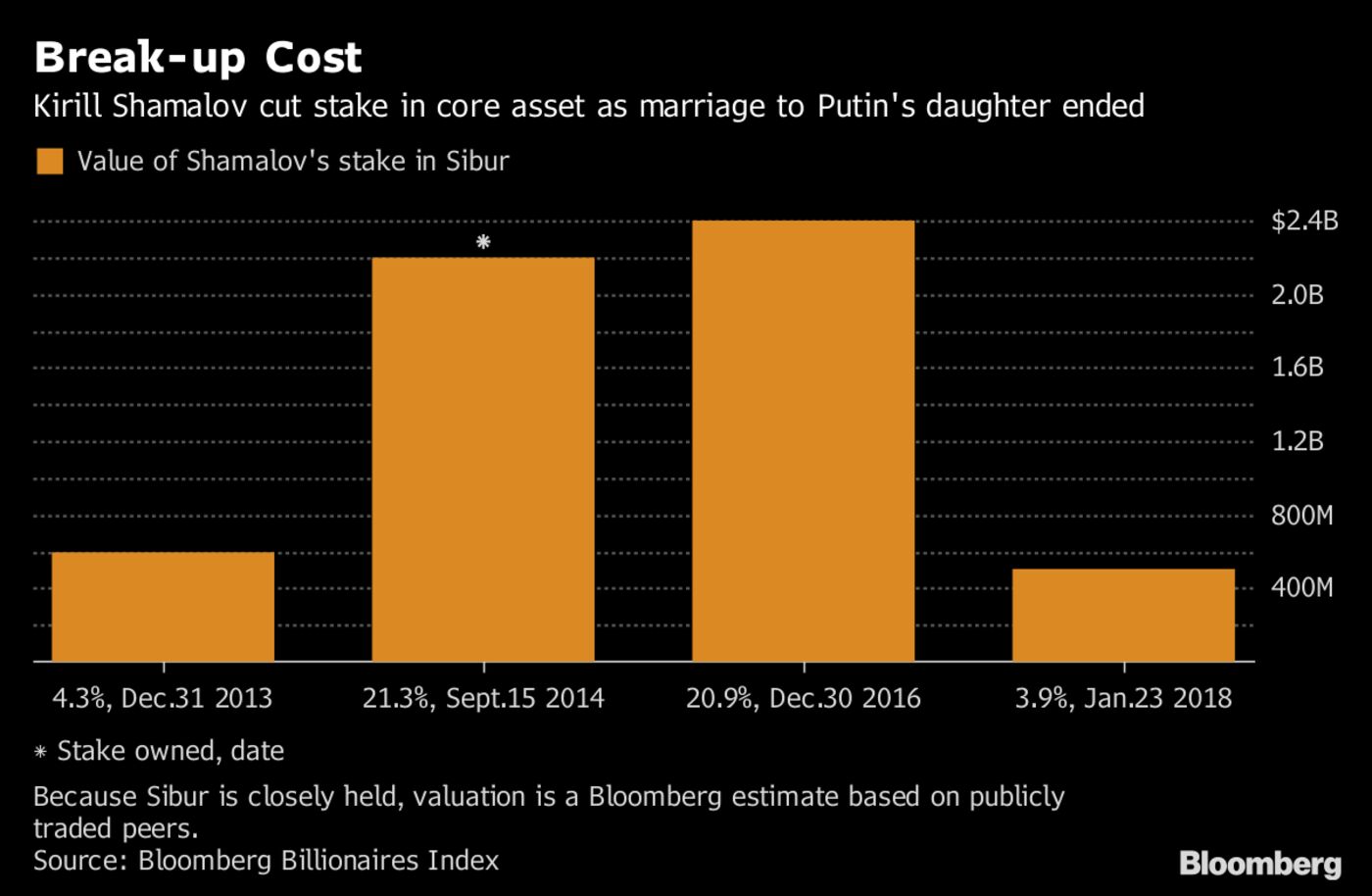
Bloomberg Billionaires Index
These are the kinds of relationships that are being increasingly scrutinized by the Treasury Department and other agencies in Washington, where investigators have until Jan. 29 to submit a list of “oligarchs” who may be subject to future penalties. There’s growing concern among Russia’s elite that the U.S. blacklist will be expanded to include progeny, complicating their lives for years.
QuicktakeTrump-Russia Saga
A person close to Shamalov denied any connection between the Sibur transactions and his marriage. Speaking on condition of anonymity, this person said that the initial 4.3 percent stake Shamalov gained was the result of a management stock-option plan and that the purchase from Timchenko was a joint acquisition with Shamalov’s father. The Shamalovs “barely broke even” when the investment turned out worse than they had hoped, the person said.
Shamalov declined to comment through a representative. Tikhonova’s office didn’t respond immediately to a request for comment, nor did Putin’s spokesman, Dmitry Peskov, Gazprombank or Mikhelson. Sibur’s press service said Shamalov rose through its ranks and was awarded his first stake by shareholders based on performance. A spokesman for Timchenko said his sale to Shamalov was priced at the market rate. Shamalov’s father couldn’t be reached for comment.
Separating from the Putin family hasn’t been a total loss for Shamalov, who’s worth about $800 million, according to the Bloomberg Billionaires Index. That’s due mainly to the 3.9 percent of Sibur he still owns, a stake that is currently valued at about $504 million.
This estimate doesn’t take into account any interest Shamalov might have paid on the Gazprombank loan or any changes to his marital status. Under Russian law, former spouses are entitled to half of all assets accrued during marriage unless a prenuptial agreement was signed.
So assiduously does the Kremlin guard the Putin family’s privacy that even off the record none of the people contacted for this story would say whether Tikhonova has formally divorced or when, exactly, she got married.
Russian media are all but banned from reporting about his daughters, Katerina, 31, and Maria, 32, so their lives are shrouded in mystery. Even their maiden names are different.
Oliver Stone
Putin, who’s seeking to extend his 18-year rule in March elections, rarely talks about his family in public, citing security concerns. He announced his own divorce to a television reporter as he and his then-wife Lyudmila were leaving a ballet inside the Kremlin in 2013.
In 2015, Putin said more about his daughters than ever before, though in characteristically vague terms. Both women graduated from Russian universities and speak multiple languages, he said, adding that they were “doing well” in their chosen careers, keeping “a low profile” and avoiding business and politics. Earlier that year, Tikhonova and Shamalov attended the World Economic Forum in Davos, the RBC newspaper reported.
There’s a YouTube video of Tikhonova dancing in 2013 that’s been viewed more than 1.3 million times. And it’s public knowledge that she helps run a startup incubator at Moscow State University whose sponsors include Gazprombank, Sibur and several companies directly controlled by the state.
Less is known about Maria, reportedly an endocrinology researcher in Moscow who’s married to a Dutchman. The Russian public didn’t learn that the couple had given birth until Putin told Hollywood director Oliver Stone during a series of interviews last year that he’d become a grandfather.
Presidential Account
As for Shamalov, he may still be singled out for U.S. sanctions even if he no longer has direct ties to the Kremlin.
His father, Nikolai, was blacklisted over the Ukraine conflict by the European Union, which called him a part of “an influential group” around Putin. The elder Shamalov is a shareholder in the first Russian entity slapped with U.S. restrictions, Bank Rossiya, a St. Petersburg lender partly owned by Timchenko, who was under sanctions when he sold his Sibur stake to Kirill Shamalov.
But any U.S. penalties imposed on the younger Shamalov, an alum of the same St. Petersburg law school as Putin, would likely only strengthen his standing in Russia. After Rossiya was punished by the Treasury for being the “personal bank” of senior government officials, Putin ordered the Kremlin to open an account in his name and send his presidential salary there.
— With assistance by Henry Meyer, Gregory White, and Torrey Clark
if what they're saying is in that memo is true.


:ALERTRED::ALERTRED::ALERTRED:
https://www.washingtonpost.com/worl...b5468e-18f2-11e8-92c9-376b4fe57ff7_story.html
Russian spies hacked the Olympics and tried to make it look like North Korea did it, U.S. officials say

Russian military spies hacked several hundred computers used by authorities at the 2018 Winter Olympic Games in South Korea, according to U.S. intelligence.
They did so while trying to make it appear as though the intrusion was conducted by North Korea, what is known as a “false-flag” operation, said two U.S. officials who spoke on the condition of anonymity to discuss a sensitive matter.
Officials in PyeongChang acknowledged that the Games were hit by a cyberattack during the Feb. 9 Opening Ceremonies but had refused to confirm whether Russia was responsible. That evening there were disruptions to the Internet, broadcast systems and the Olympics website. Many attendees were unable to print their tickets for the ceremony, resulting in empty seats.
Analysts surmise the disruption was retaliation against the International Olympic Committee for banning the Russian team from the Winter Games due to doping violations. No officials from Russia’s Olympic federation were allowed to attend, and while some athletes were permitted to compete under the designation “Olympic Athletes from Russia,” they were unable to display the Russian flag on their uniforms and, if they won medals, their country’s anthem was not played.
As of early February, the Russian military agency GRU had access to as many as 300 Olympic-related computers, according to an intelligence report this month.
The Office of the Director of National Intelligence declined to comment.
[World Anti-Doping Agency confirms Russian hack of Rio Olympic drug database]
The intelligence, which has not been publicly affirmed, is consistent with reports from private-sector analysts who have said they saw signs Russia had targeted the 2018 Olympics. It also would continue a pattern of such attempts, including during the 2016 Summer Games in Rio de Janeiro.
Some U.S. officials are concerned the Russians may try to disrupt the Closing Ceremonies on Sunday. “We’re watching it pretty closely,” said one. “It’s essentially a Korean problem,” the official added. “We will help the Koreans as requested.”
Apart from accessing the computers, GRU cyber-operators also hacked routers in South Korea last month and deployed new malware on the day the Olympics began, according to Western intelligence agencies. Such access could enable intelligence collection or network attacks, officials said.
It is not clear whether the disruptions during the Opening Ceremonies were the result of that access, but the development is concerning regardless, information security experts said.
“Anyone who controls a router would be able to redirect traffic for one or more selected targets or cause total disruption in the network by stopping the routing entirely,” said Jake Williams, a former National Security Agency cyber-operator and co-founder of Rendition Infosec, a cybersecurity firm.
“Development of router malware is extremely costly, and Russia would likely use it only in locations where it contributes to accomplishing a high-value goal,” said Williams.
The GRU hackers are thought to work for the agency’s Main Center for Special Technology, or GTsST, according to intelligence agencies. That unit has been highly active in information warfare against the West and was behind the NotPetya cyberattack that crippled computers in Ukraine last year.
[The CIA concludes the Russian military was behind NotPetya cyberattack in Ukraine]
Two years ago, the GRU penetrated a database containing drug test results and confidential medical data, and posted information about noteworthy U.S. athletes including tennis stars Serena and Venus Williams, four-time gymnastics gold medalist Simone Biles and women’s basketball standout Elena Delle Donne.
That action was widely seen as payback after nearly every member of Russia’s track and field team was banned from the 2016 Olympics. Numerous investigations uncovered a widespread, government-run doping scheme that dated back years.
Russia has a long history of undertaking such “active measures” against the Olympic Games, noted Thomas Rid, a professor of strategic studies at Johns Hopkins University. During the 1984 Olympics in Los Angeles, Soviet intelligence released fake Ku Klux Klan leaflets threatening violence against African athletes as part of an effort to embarrass the United States, he said. That year, the Soviets led a 14-nation boycott of the Games in retaliation for a U.S. boycott of the 1980 Summer Games in Moscow, which was prompted by the Soviets’ 1979 invasion of Afghanistan.
[NotPetya ‘ransomware’ was a ruse to hide hackers’ identity]
Checkpoint newsletter
Military, defense and security at home and abroad.
The 1984 effort failed, Rid said, because the U.S. government “very quickly” revealed the Soviet attempt. As a result, no African athletes withdrew from the Games.
While “old-school” tactics relied on leaflets among other things, the Internet has provided new tools to spread disinformation, he said.
In this case, the GRU sought to make it appear as though the intrusions were the work of North Korean hackers by using North Korean IP addresses and other tactics, said the officials. Such deception is common for the GRU.
88m3
Fast Money & Foreign Objects
The Atlantic
24 mins ·
"As the battle lines on the ground converge, it is no longer possible to ignore the fact that the fight against isis is also the fight for the future of Syria and the Middle East. Moreover, the war appears to be expanding."

Russia Is Abetting Mass Murder in Syria
By standing by and watching a slow-motion Rwanda unfold, the U.S. risks…
THEATLANTIC.COM
24 mins ·
"As the battle lines on the ground converge, it is no longer possible to ignore the fact that the fight against isis is also the fight for the future of Syria and the Middle East. Moreover, the war appears to be expanding."

Russia Is Abetting Mass Murder in Syria
By standing by and watching a slow-motion Rwanda unfold, the U.S. risks…
THEATLANTIC.COM
88m3
Fast Money & Foreign Objects
The Economist
4 mins ·
On the day of the announcement Magnit’s shares fell by 10% in London, and nearly 8% in Moscow

One of Russia’s most successful private entrepreneurs sells–to the state
Sergei Galitsky’s sale of 29.1% of his shares in Magnit to VTB, a state-owned…
ECONOMIST.COM
mhmm
4 mins ·
On the day of the announcement Magnit’s shares fell by 10% in London, and nearly 8% in Moscow

One of Russia’s most successful private entrepreneurs sells–to the state
Sergei Galitsky’s sale of 29.1% of his shares in Magnit to VTB, a state-owned…
ECONOMIST.COM
mhmm
ADevilYouKhow
Rhyme Reason
ADevilYouKhow
Rhyme Reason
Russian millions laundered via UK firms, leaked report says
Denmark’s biggest bank believes cash was funnelled through British companies by people linked to Vladimir Putin’s family and the FSB spy agency
Luke Harding
Mon 26 Feb 2018 13.00 ESTLast modified on Tue 27 Feb 2018 03.07 EST
Shares
1357
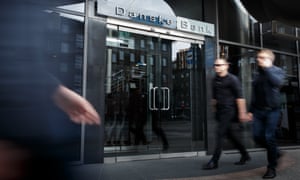
The Estonian branch of Denmark’s Danske bank. Photograph: Andras Kralla/Äripäev
A Danish bank accused of money laundering shut down Russian accounts after concluding that they were being used to funnel cash through British companies by members of Vladimir Putin’s family and the FSB spy agency, according to leaked reports.
Danske, Denmark’s biggest bank, closed 20 Russian customer accounts in 2013 following a whistleblower report alleging that its Estonian branch was involved in suspicious and possibly illegal activity.
Last September it emerged that the same branch was at the centre of a secret lobbying operation in which some $2.9bn (£2.2bn) of mostly Azerbaijani money was channelled through opaque British companies.
The latest revelations concern a different group of firms, most registered in London. In summer 2013 Danske bank employees discovered that one of these UK entities, Lantana Trade LLP, had filed “false accounts” to Companies House.
According to the whistleblower report, Lantana told Companies House that it was “dormant”, with only a very limited financial turnover. In fact, Lantana held large deposits and made daily transactions of millions of euros. Lantana’s Danske account – opened in late 2012 – functioned for 11 months.
The ultimate owners of Lantana, and related limited partnerships, were Russians. But their identities were hidden behind a series of offshore management firms based in the Marshall Islands and the Seychelles.
The whistleblower report was obtained by the Danish newspaper Berlingske, and shared with the Guardian and the Organised Crime and Corruption Reporting Project (OCRRP). It said the bank had failed to establish who was behind Lantana, adding that “apparently it was discovered that they included the Putin family and the FSB”.
Details were sent to Estonia’s financial intelligence unit and passed to Danske’s top management. Danske only began a full inquiry in 2017. It did not inform either the UK or Companies House.
Danske said on Monday: “We have launched a thorough investigation to get to the bottom of the events at that time in our Estonian branch.” It refused to comment on “specific customers” but said it had “closed down” the “entire portfolio in question” featuring “non-resident” Russians.
The revelations again highlight the use of the lightly regulated British corporate landscape to move large sums of money around, beyond the purview of regulators and tax authorities. In this case the beneficiaries appear to have been figures with Kremlin connections.
Baltic countries are a major entry point into the western financial system for Russian cash. Last week the US Treasury accused Latvia’s third biggest bank of “institutionalised money laundering”. Days later the country’s central bank chief, Ilmārs Rimšēvičs , was arrested following allegations he took a €100,000-plus bribe (paywall).
Rimšēvičs has denied all allegations and has denounced them as a smear campaign.
Danske’s Estonian managers grew concerned following a tip-off from inside Russia. They found that Lantana was closely linked to Promsberbank, a little-known bank in Podolsk, outside Moscow. Promsberbank’s senior managers represented Lantana.
One member of Promsberbank’s board was Igor Putin, the cousin of Russia’s president. A major shareholder was Alexander Grigoriev, a banker who, according to the Organised Crime and Corruption Reporting Project (OCCRP), has FSB ties. Another was Alexei Kulikov, who was arrested in 2016 and charged with “large-scale fraud”. Promsberbank collapsed in 2016 when it emerged that 3bn roubles (about £38m) had disappeared.
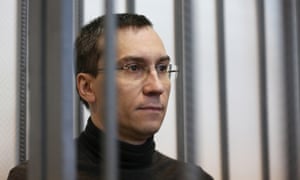
FacebookTwitterPinterest
Alexei Kulikov was arrested in 2016 and charged with ‘large-scale fraud’. Photograph: Bloomberg via Getty Images
One former Danske employee said the bank’s internal investigation revealed “high-ranking employees” from Promsberbank were behind Lantana. The employee told Berlingske newspaper: “The company and cash flows were controlled by the bank. It wasn’t just rumours. This is valid information.”
The trio were closely connected with another scandal featuring Germany’s Deutsche Bank. Deutsche has admitted that between 2011 and 2015 its Moscow division ran a $10bn (£7bn) “mirror trades” scheme. The scheme allowed VIP Russian clients to transform roubles into dollars, via related corporate entities that “bought” and “sold” identical volumes of stock.
Quick guide
How is money laundered out of Russia?
Kulikov had a Danske account. Several of the entities closed down by Danske in 2013 were involved in Deutsche Bank mirror trading, including Chadborg Trade LLP, based in Potters Bar in Hertfordshire, Cherryfield Management and Financial Bridge. Deutsche Bank – the main lender to Donald Trump – paid $630m in US-UK fines for laundering Russian cash.
Danske’s decision to investigative went down badly in Moscow, where Lantana had a city centre office. A Danske account manager flew to the Russian capital to obtain documents revealing Lantana’s real owners. He left a meeting shaken, reporting that his Russian clients were “furious”, bank sources say.
A few weeks later a meeting was held at Danske’s office in the Estonian capital, Tallinn. Two Russians refused to identify themselves and allegedly told bank staff: “Do you really feel you can walk home safely at night?” They added: “The bank will sink after this.” These threats were reported internally.
L Burke Files, an international financial investigator, said the fact that the same entities were used in different schemes “does not surprise me one bit”. Professional criminals “design or craft” a package to get round compliance checks and then “use it at every bank”, he said.
He described the Lantana case as “very serious”, adding: “The activity in the account was in every way indicative of money laundering. There were many large transactions and all of them done in one or two days. The money didn’t linger. Here is a small branch of a very big bank that has an account moving tens of millions every day.”
The scale of the fraud is unknown. According to Files it could have been between $2.2bn and $3.3bn in total, based on a pattern of $10m-plus being laundered every day.
He added: “This is such an excellent way to move large sums of money that I am sure is still occurring. It is a very difficult trail to follow.”
Grigoriev allegedly masterminded another big league money-laundering scheme dubbed the Global Laundromat. Between 2010 and 2015 at least $20bn was moved out of Moscow into western banks. The money went via Moldova and Latvia. Igor Putin sat on the board of a bank involved in the fraud, the Russian Land Bank or RZB.
Putin declined to comment. In a letter written in 2014, he said: “My personal experience, gained in recent years, proves the truth of the thesis that the Russian banking system should be radically rehabilitated and cleaned of troubled banks headed by people with doubtful reputations.”
Grigoriev and Kulikov are currently in jail. Grigoriev was arrested in 2015, a year after RZB was shut for money-laundering offences. Kulikov was imprisoned in a different matter. In April 2015 Russia’s central bank revoked Promsberbank’s licence. So far Kulikov has not replied to a letter sent to him in prison inviting comment.
The British companies involved in the scam were wound up. Lantana was dissolved in December 2015.
The damning whistleblower report said that Danske had suffered a “near total process failure”. It did not identify Lantana’s true owners or take action over “suspicious payments made just under compliance control limits”. The bank “breached numerous regulatory requirements”, “behaved unethically” and “may have committed a criminal offence”, it said.
Robert Endersby, Danske’s British chief risk officer at the time, who saw the report, declined to comment. Danske said it now had a “very different and stronger control set up in Estonia”. It admitted it should have acted “faster”.
Madis Reimand, the head of Estonia’s financial intelligence unit, would not comment directly on the Lantana group of companies.
He said: “Generally speaking the purpose of such money-laundering schemes is to move funds out of Russia, to get the money into the western financial system, and to do it in a non-transparent and secretive manner.”
RUSSIA ATTEMPTED TO MURK ANOTHER SPY WHO DEFECTED TO THE U.K.!!!!!
Critically ill man 'former Russian spy'
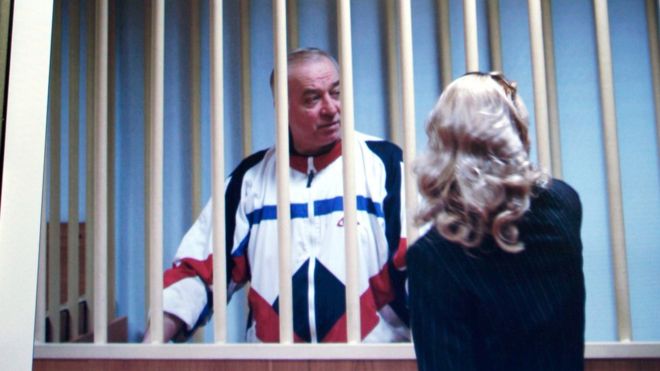
Sergei Skripal, pictured here on the day of his sentencing in August 2006, was jailed for 13 years
A man who is critically ill after being exposed to an unknown substance in Wiltshire is a Russian national convicted of spying for Britain, the BBC understands.
Sergei Skripal, who is 66, was granted refuge in the UK following a "spy swap" between the US and Russia in 2010.
Police declared a major incident on Sunday after a man and a woman were reported ill at a shopping centre in Salisbury.
The substance has not been identified.
A number of locations in the city centre were cordoned off and the A&E department was closed.
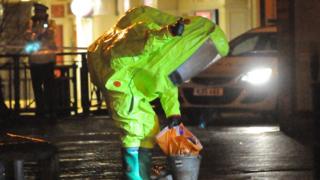
The hospital's A&E was closed on Monday while two people were treated
Skripal, who is a retired Russian military intelligence colonel, was jailed for 13 years in 2006 for spying for Britain.
He was convicted of passing the identities of Russian intelligence agents working undercover in Europe to the UK's Secret Intelligence Service, MI6.
Russia said Col Skripal had been paid $100,000 for the information, which he had been supplying from the 1990s.
He was one of four prisoners released by Moscow in 2010 in exchange for 10 US spies, as part of a swap.
Col Skripal was later flown to the UK.
He and a woman, thought to be in her 30s, are being treated at Salisbury District Hospital.
Police are investigating whether a crime has been committed, following the incident which began at 16:15 GMT on Sunday at the Maltings shopping centre in central Salisbury.
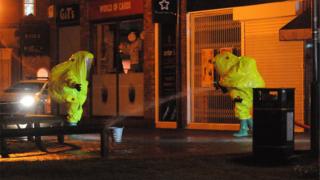
Public Health England has not confirmed what the substance was
An area around the Maltings shopping centre and several other parts of the city were cordoned off as teams in full protective gear used hoses to decontaminate the street.
Neighbours at Skripal's home in Salisbury say police arrived around 17:00 GMT on Sunday and have been there ever since.
They said he was friendly and in recent years had lost his wife.
This breaking news story is being updated and more details will be published shortly. Please refresh the page for the fullest version.

Were you in the area at the time? Have you been affected by the incident? You can share your experience by emailing haveyoursay@bbc.co.uk.
Please include a contact number if you are willing to speak to a BBC journalist. You can also contact us in the following ways:
- WhatsApp: +447555 173285
- Tweet: @BBC_HaveYourSay
- Send pictures/video to yourpics@bbc.co.uk
- Upload your pictures/video here
- Send an SMS or MMS to 61124
Russian spy critically ill after being 'poisoned' by unknown substance in Salisbury

Sergei Skripal is being treated in hospital
A man who is critically ill after exposure to an unknown substance in Salisbury, is a former Russian spy, it is understood.
Sergei Skripal, 66, who was jailed in Russia for treason, but later came to the UK as part of a 'spy swap', collapsed in a shopping centre in Salisbury on Sunday.
He and a woman were rushed to hospital where they are still being treated.
It is thought the pair may have been exposed to the powerful synthetic drug, Fentanyl, which is up to 10,000 times more powerful than heroin and has been linked to scores of deaths in the UK.
A major incident was later declared at Salisbury hospital and its Accident & Emergency unit had to be closed.
In a statement, temporary Assistant Chief Constable, Craig Holden of Wiltshire Police, said: "The two people – a man aged in his 60s, and a woman aged in her 30s – were found unconscious on a bench in The Maltings in Salisbury.
“Police officers, as well as colleagues from the ambulance and fire services attended the scene and cordons were put in place.
“The pair, who we believe are known to each other, did not have any visible injuries and were taken to Salisbury District Hospital. They are currently being treated for suspected exposure to an unknown substance. Both are currently in a critical condition in intensive care."
“Because we are still at the very early stages of the investigation, we are unable to ascertain whether or not a crime has taken place."
Mr Skripal is a former Russian army colonel, who was convicted of passing the identities of Russian agents working in Europe to MI6.
In 2006 he was sentenced to 13 years in jail for spying for Britain, with Russian prosecutors claiming he had taken tens of thousands of pounds of the security services.
He came to the UK in 2010 as part of a spy swap, and later settled in Salisbury, Wiltshire.
Sergei Skripal: does revenge for treason lie behind harm to ex-spy?
Sergei Skripal: does revenge for treason lie behind harm to ex-spy?
Observers note ominous pattern of ‘bad luck’ befalling family of pardoned Russian colonel
Luke Harding
Tue 6 Mar 2018 12.06 ESTLast modified on Tue 6 Mar 2018 18.45 EST
Shares
260

Sergei Skripal, who is critically ill in a Salisbury hospital after ‘suspected exposure to an unknown substance’. Photograph: Handout
Inside a van, and rattling towards the airport, Sergei Skripal was in high spirits. It was July 2010. Without explanation Skripal had been taken from a penal colony, where he had spent the previous five and a half years, and transported in handcuffs to Moscow. Now he was about to board a flight to Vienna. His ultimate destination: Britain.
Unlikely though it seemed, Skripal was about to be swapped in classic cold war fashion. On the tarmac at Vienna airport he was to be exchanged for 10 Russian “sleeper agents” caught by the FBI and on their way home to Moscow. Heading in the other direction were three fellow Russians, including Igor Sutyagin. All were accused of working for UK or US intelligence.
Play Video
2:12
Who is the Salisbury spy Sergei Skripal? – video explainer
Sutyagin had been shovelling cinders on to a path in his prison compound in Russia’s Arctic north when he was told he should prepare to go. He found himself in the same van as Skripal, under guard and trundling towards freedom. “I talked to him for several hours,” Sutyagin said. “We were in the same van and then in the same plane.”
Russian penal colonies are notoriously tough. The biggest privation for Skripal, Sutyagin said, was separation from his family – his wife, Liudmilla, daughter Yulia and grown-up son. For much of his time in prison, following a conviction in 2006 for passing secrets to MI6, Skripal was incarcerated in Mordovia, more than 300 miles south-east of Moscow. This was a grim place of watchtowers and barbed wire.
“Sergei was excited about being reunited with his family. It seemed to me they were his major joy. I think family played a very important role in his life,” Sutyagin said. However, the swap agreement raised a dilemma for Sutyagin and Skripal. They were allowed to take one family member with them. Who, they wondered, should they take with them into exile?
Once in the UK their paths diverged. Sutyagin became a fellow at a thinktank, the Royal United Services Institute, gave lectures on Vladimir Putin’s darkening state, and kept a high public profile. Skripal, by contrast, eschewed London. He settled with Liudmilla in the comparative quiet of Wiltshire.
Skripal did not exactly vanish. His semi-detached four-bedroom home, bought in 2011 for £260,000, was registered in his own name. In Russia, Skripal had worked for military intelligence and the GRU, the most powerful and secret of Russia’s three spy agencies. He reached the rank of colonel. Now, at least officially, he was a retired local government planning officer.
In provincial south-west England was he at least safe? The answer is, we don’t yet know. On Sunday afternoon Skripal and his daughter, Yulia, were found in a comatose state on a bench in the centre of Salisbury. This followed exposure to what police describe as “an unknown substance”. They are both critically ill in hospital. Scotland Yard’s counter-terrorism unit is involved.
There are few details about what, if anything, might have caused their terrible symptoms, or what might have befallen Skripal nearly eight years after he exited Moscow. Inevitably, though, the case invites comparison with the 2006 murder of Alexander Litvinenko, who was poisoned in Mayfair by two Kremlin assassins. The killers used a weapon of low-key English style: a cup of (deadly) tea.
Litvinenko was a former FSB officer who had escaped to the UK in 2000 with his wife, Marina, and small son, Anatoly. From London he waged a ferocious campaign against Putin, in conjunction with another Kremlin irritant abroad, the oligarch Boris Berezovsky. Berezovsky was found dead in 2012 at the Berkshire home of his former wife. Police believe it was suicide. Berezovsky’s friends are not so sure.
Skripal’s case is different. The Russian security service FSB viewed Litvinenko unambiguously as a traitor. But Skripal received a pardon in 2010 from Dmitry Medvedev, Russia’s president at the time; in cold war times this should have made him untouchable. He had betrayed the motherland but admitted his crime (he pleaded guilty and got 13 years). He was swapped as part of a state-to-state deal.

FacebookTwitterPinterest
A police cordon in Salisbury, erected after Sergei Skripal and his daughter, Yulia, were found unconscious on a nearby bench on Sunday. Photograph: Neil Hall/EPA
The methods of the cold war continue as Russia’s seeks to influence western democracies and push favoured candidates – including the US president, Donald J Trump.
But the ideology which shaped the 20th century has gone, making Putin’s revisionist Russia more unpredictable and more dangerous. In 2016 a public inquiry said that Putin “probably approved” Litvinenko’s assassination. Given the response from the British authorities then – a few Russian diplomats kicked out, the killers’ extradition sought – some observers believe Skripal’s case is Litvinenko II.
“Putin has done it once and effectively got away with it. Why would he not do it again?” one Russia expert, with links to British intelligence, said on Tuesday.
Sutyagin, speaking on a mobile phone by the side of a road, said that any rational assessment would rule out Kremlin involvement. In a matter of days Putin will be “elected” president for a fourth time; there is no question who will win (all genuine political opposition was squashed long ago) but the Kremlin is keen to achieve a high turn-out in the presidential election. “This is the worse possible time,” Sutyagin observed.
And, it has to be noted, several Russian defectors continue to live in the UK. They include Oleg Gordievsky, the designated head of the KGB’s London station, who had been secretly working for British intelligence since 1974. In 1985 MI6 smuggled him out of the Soviet Union. His information proved a goldmine for British spies, and historians.
Another is Viktor Suvorov, a former GRU officer who defected in the 1970s from the Soviet mission in Switzerland. He now writes books. (Suvorov’s novel Aquarium opens with a GRU officer who betrayed secrets being fed alive into the in-house crematorium – a scene based on a chilling real-life black and white video, shown to all GRU recruits.)
Still, Sutyagin recognises that the siloviki faction in Russia’s government, made up of hardline former KGB and GRU officers, takes a dim view of treachery.
“I was once told by a Russian diplomat that Putin had compared me to Judas. That is their attitude,” Sutyagin said.
Alex Goldfarb, Litvinenko’s friend, said: “They had a motive. There is a history for these kinds of actions.”
Tragically, the family life that Skripal yearned for while behind bars was cut short. Liudmilla died in October 2012, apparently from natural causes; she had been suffering from cancer of the womb. Yulia reported her death. In recent years Yulia has been living in the UK, working for Nike and at the Holiday Inn in Southampton.
According to relatives, Skripal’s son died during a trip to St Petersburg with his girlfriend. He was 43. What killed him is not known. There are also suggestions that Skripal’s brother died recently too. Now Skripal and his daughter are fighting for their lives in hospital. It’s possible, of course, that the family has simply had bad luck. But if there is a pattern here it’s an ominous one.
After his flight from Russia Suvorov got to know Litvinenko. The Litvinenkos lived in Muswell Hill, London. On one occasion they were the victims of a mysterious firebombing. On another a Russian diplomat banged on their front door. Given this harassment why didn’t the Litvinenkos consider moving out to the country, to somewhere safer, Suvorov suggested?
Litvinenko ignored the advice. He remained in the capital. In 2003 he started working as an expert on organised crime for MI6. His killers first tried to poison him, during a business meeting in Mayfair in October 2006, hours after they got to Gatwick airport from Moscow. They succeeded three weeks later, in November, escaping out of Heathrow before Scotland Yard had any inkling about what had happened.
Skripal was no Litvinenko. He must have assumed that Moscow had forgotten about him. It is understood he had nothing to do with the dossier on Russia and Trump written by the former British intelligence officer Christopher Steele. Before Steele went into private business he led MI6’s response to Litvinenko’s murder. Skripal was not a source and whatever he knew about Russian military intelligence was long out of date.
Nevertheless, if he is a victim of Kremlin malfeasance the message is clear. There is no statute of limitation for treason. Russia’s spy agencies do not forgive and do not forget. The old cold war rules that once governed spying – ours and theirs – no longer apply.
88m3
Fast Money & Foreign Objects
6 month anniversary of murder of Maltese journalist Daphne Caruana Galizia
Mastermind behind Maltese journalist's murder is being protected, says husband
Mastermind behind Maltese journalist's murder is being protected, says husband



